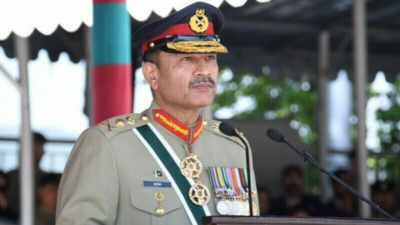ARTICLE AD BOX

ISLAMABAD: Pakistan’s army chief, Field Marshal Asim Munir, is set to visit the United States for the second time in two months, a move that underscores the growing military alignment between Islamabad and Washington yet also highlights the intensifying political divisions Munir faces at home and abroad.He is expected to attend the farewell ceremony of US Central Command (Centcom) commander General Michael E Kurilla in Tampa, Florida this week. The visit follows Kurilla’s own trip to Pakistan in July during which he was awarded the Nishan-e-Imtiaz (Military), one of the country’s top honours, for strengthening defence ties.This renewed military engagement reflects a strategic recalibration after years of tension.
In June, Munir made headlines for being hosted at a private White House lunch by US President Donald Trump, an unprecedented gesture for a Pakistani military chief, notably unaccompanied by any civilian leaders. Trump publicly credited Munir with defusing a crisis with India following the Pahalgam terror attack, and even claimed the general helped “avert a nuclear war”.
New Delhi maintains that the cessation of hostilities was on account of an understanding between India and Pakistan to stop military action.
However, Munir’s engagements in the US have not gone unchallenged. On Aug 5, coordinated protests erupted in multiple US and European cities on the call of imprisoned former PM Imran Khan, demanding his release and condemning the military’s role in the post-May 9, 2023 crackdown. The demonstrations – organized largely by the Pakistani diaspora and Pakistan Tehreek-e-Insaf chapters – signaled Khan’s continued influence despite being behind bars.These protests followed similar scenes in June during Munir’s previous US visit. Outside Washington’s Four Seasons Hotel, demonstrators shouted slogans such as “mass murderer” and “dictator”, while a digital billboard in New York’s Times Square branded Munir a “fraud” and “liar”. PTI supporters accuse the military of orchestrating a “civilian façade” to mask what they call outright military rule.Despite mounting protests and international scrutiny, Washington appears eager to re-engage with Pakistan’s military.
At a congressional hearing in June, Gen Kurilla praised Pakistan as a “phenomenal partner” in counterterrorism, citing cooperation in capturing five ISIS-Khorasan operatives using US intelligence. The Trump administration sees Pakistan’s military as a critical player amid regional instability, especially as tensions flare in the Middle East and China expands its footprint across South and Central Asia.Pakistan is also offering a broader strategic package.
Proposals reportedly include duty-free access for rare earth minerals, cooperation in emerging tech and cryptocurrency regulation, and expanded trade ties — all of which enhance the military’s leverage in shaping foreign policy and economic outreach.But Munir’s growing international profile has reignited debate over Pakistan’s internal power structure. Critics say his high-level US engagements, while excluding civilian representatives, reinforce the military’s dominance over national decision-making.
With Khan silenced and democratic space shrinking, many fear a deepening authoritarian trajectory.Online opinion remains sharply polarised. Some hail Munir’s diplomatic overtures as pragmatic and strategic, while others decry the US for legitimising what they see as military overreach. “A slap in the face to democracy,” one PTI supporter posted.As Munir heads to Tampa, he faces a dual test: to solidify Pakistan’s global standing while fending off mounting domestic and diaspora opposition. For now, the military’s control remains unshaken — but so does the resistance.



.png)
.png)
.png)
















 2 hours ago
6
2 hours ago
6








 English (US) ·
English (US) ·